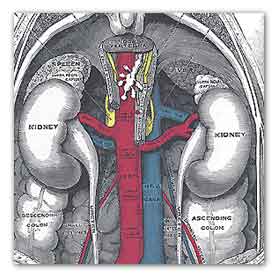News and Insights for
your best life. Online since 1998
- Home Health
- Breaking news
- In caso di...
- Per saperne di
più... - Medicina occidentale
- Medicine complementari
- Medicina cinese
e agopuntura - Omeopatia
- Fitoterapia

Poor eating habits, smoking and obesity are associated with increased risk for kidney disease, according to new research published online in the National Kidney Foundation's American Journal of Kidney Disease.

Kidney - Henry Gray (1825–1861), Anatomy of the Human Body, 1918.
Researchers led by Alex Chang, MD, MS of Johns Hopkins University found that people with normal kidney function whose diet quality was poor—high in red and processed meats, sugar-sweetened beverages and sodium, and low in fruit, legumes, nuts, whole grains and low-fat dairy—were more likely to develop kidney disease. Only 1% of individuals with no unhealthy lifestyle-related factors developed protein in their urine, an early indicator of kidney damage. That is compared with 13% of participants with three unhealthy lifestyle factors such as obesity, poor diet and smoking.
Obese people - those with body mass index (BMI) over 30 -- were twice as likely to develop kidney disease. An unhealthy diet independently impacted risk for chronic kidney disease even after adjusting for weight and other lifestyle-related factors.
Researchers also noted an association between those who currently smoke and the development of chronic kidney disease. Those who smoked were about 60% more likely to develop kidney disease.
In the first study to examine kidney disease risk factors in healthy young people, researchers used longitudinal data spanning 15 years on over 2,300 black and white adults, aged 28-40 from the Coronary Artery Risk Development in Young Adults (CARDIA) Study.
"Unlike family history of kidney failure, diet, smoking, and obesity are modifiable lifestyle factors that we can all control. By eating well, quitting smoking, and maintaining a normal weight, people can protect their kidneys and prevent future damage," says Dr. Chang.
Overall, those who developed kidney disease were more likely to be African American, living with diabetes or high blood pressure, have a family history of kidney failure, and consumed more soft drinks, red meat, and fast food than those who did not develop kidney disease.
Risk Reduction Tips from the National Kidney Foundation:
Cut the sodium: Americans today consume 50% more than the recommended daily quantity of sodium -- 2,300 mg of sodium, about one teaspoon of salt, should be the daily limit.
Reduce red meat: High protein diets, especially those containing large quantities of animal protein, may harm the kidneys. Red meat is also high in saturated fat.
Stop the soda: Sugar-sweetened beverages, such as sodas are high calorie and contain no nutritious value. Colas also have phosphorus additives which can harm the kidneys.
Pass on processed foods: Crackers, potato chips, deli meats, cheese spreads, and instant potato mix are all examples of processed foods that are high in sodium and phosphorus additives - both which can have negative effects on the kidneys.
Slow down with sugar: An overdose of sugar can lead to diabetes and obesity, which are linked to kidney disease.
Kidney Disease Facts from the National Kidney Foundation:
26 million Americans have kidney disease and most don't know it.
73 million Americans are at risk for kidney disease due to diabetes, high blood pressure or a family history of kidney failure.
African Americans are three times as likely to experience kidney failure as Caucasians. Hispanics are 1.5 times as likely.
Kidney disease kills 90,000 Americans each year --more people than breast or prostate cancer.
For more information
http://www.kidney.org/
MDN
del Dott. Turetta
Quali sono i problemi o le disfunzioni che possono giovarsi di un intervento omeopatico d'urgenza e, di conseguenza, come dovrebbe essere un ideale armadietto medicinale omeopatico casalingo.- Home -
- Health -
- Depressione -
- Sexuality
- Environment -
- Food -
- Musica -
- Capirsi -
- Grafologia -
- Ridere
Copyright © 1998/2018 www.mybestlife.com tutti i diritti sono riservati eccetto quelli già di altri proprietari.
.In caso di
Pubblicità
Per saperne di più su
Pubblicità
Pubblicità
Pubblicità
Pubblicità


